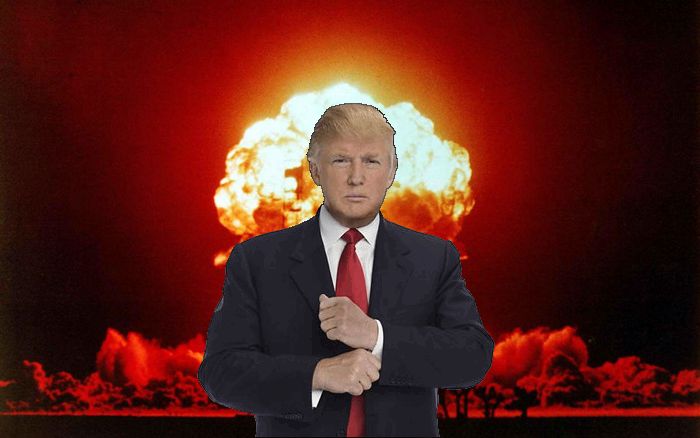Modern nuclear weapons have the potential to reignite arms race and increase the risk that nuclear weapons might be used. Thus, in order for the U.S. to strengthen its global leadership in nuclear disarmament, enhance its ability to deter new weapon states, improve its efforts to prevent nuclear terror, and reduce the danger of the use of nuclear weapons, it should stop building modern nuclear weapons and replace existing ones with potentially equally effective ways of achieving deterrence. Such ways will include the use of advanced conventional weapons or better still, as Pope Francis puts it, investing in building trust between nations so as to pave the way for total nuclear disarmament.
The world is rich with countless technologies that can contribute to national security that were not available when the decision was made to develop nuclear weapons and such technologies can now be used for deterrence.[1] For instance, the degree of precision and power of today’s conventional weapons makes them essentially an alternative to nuclear weapons. Though they may not have the utility necessary to substitute nuclear weapons completely, they are capable of acting as a deterrence given the changing landscape in the military and political roles of nuclear weapons.[2] Ordinarily, the U.S. kept nuclear weapons to deter nuclear and conventional attack from Russia and also to maintain the balance of power. Russia built nuclear weapons for the same reasons. Other major powers such as the U.K and France have nuclear weapons to deter conventional attacks from Russia and to probably elevate their political standing in the world. But as Cortright and Vayrynnen point out in their book, Towards Nuclear Zero, deterrence has moved from bilateral to a triad,[3] which makes it unlikely for the major nations with nuclear weapons to use them. Thus, instead of building modern nuclear weapons, the U.S should develop conventional precision weapons for deterrence but more importantly, lead other nations towards a complete disarmament.
Modern nuclear weapons will not make the world safer, in fact, they will heighten tensions and inspire an arms race. Already the testing of B61 has received considerable criticism from other nuclear powers. Russia called it irresponsible and provocative while North Korea termed it as a security threat to its people. Some of these countries (and even more) can also make the same weapons, hence undermining the international nuclear nonproliferation regime. The magnitude of nuclear force in even the smallest feasible weapons can lead to unprecedented consequences. Furthermore, modern nuclear weapons are not immune to uncertainties in weather conditions or errors during delivery and during target identification. A simple mistake can lead to devastating consequences. Pope Francis cautions, “nuclear weapons have long-term consequences for the world, hence, we ought not to make them easier to use, for that will devalue not just their devastation, but the lives of the survivals worldwide”[4]
In his much cited Prague speech, President Obama noted that the U.S has a moral responsibility to lead other nations towards nuclear disarmament.[5] Given that the US and Russia have been limiting their nuclear arsenal since 1969 – the US has reduced its stockpile by 84% from a Cold War peak of 31, 255 warheads in 1967 – it can be construed that the President’s speech referred to a more accelerated process. I do not think President Obama’s modern nuclear weapons, though less in number meets the spirit of his Prague speech. Having nuclear weapons in any form is an indication that their use is not inevitable and this does not make the world safe. With the increase of non-state terrorists who can easily acquire nuclear weapons, the world should reconsider whether it is safe for any country to have a nuclear infrastructure. The US is perhaps the only country with the political influence and capability of leading other nations in achieving this. But in light of its own nuclear advancement activities, less powerful nations may not trust it to negotiate a total nuclear disarmament. Hence, countries like India and Pakistan will continue increasing their nuclear arsenal.[6]
Countries often cite deterrence as the main reason for keeping nuclear weapons but some scholars have countered that argument terming it as an imperfect security strategy,[7] immoral,[8] and impractical.[9] If indeed deterrence is the main motivation, conventional precision technologies may be able to serve the function but it seems nuclear weapons mainly function to maintain the balance of power, and as long as this continues, the world will be at risk. If political leaders cannot commit to getting rid of the nuclear scourge from the world, the citizens must do this by themselves. Civil societies and ‘towards nuclear zero’ movements should keep pushing for the realization of this goal.
[1] Lukasik, S.J., Precision technologies as possible alternatives to nuclear weapons, Center for International Strategy, technology, and Policy. Pg. 3. Accessed on 4/3/2016 http://www.npolicy.org/article_file/Precision_Technologies_as_Possible_Alternatives_to_Nuclear_Weapons.pdf
[2] Cortright, D. & Vayrynnen, R. (2010) Towards Nuclear Zero. New York, NY: Routledge. Pg. 15.
[3] Cortright, D. & Vayrynnen, R. (2010) Towards Nuclear Zero. New York, NY: Routledge
[4] Pope Francis (2014) Papal statement during the Conference on Humanitarian Impact on the use of Nuclear Weapons. Vatican
[5] President Barack Obama’s remarks during his visit to Czech Republic, 2009. Accessed 4/3/2016 www.whitehouse.gov/the-press-office/remarks-president-barack-obama-prague-delivered
[6] “World Nuclear Forces,” in SIPRI Yearbook 2011: Armaments, Disarmament, and International Security, Stockholm International Peace Research Institute (Oxford University Press, 2011), Pg. 320-359.
[7] Cortright, D. & Vayrynnen, R. (2010) Towards Nuclear Zero. New York, NY: Routledge. Pg. 20
[8] Pope Francis (2014) Papal statement during the Conference on Humanitarian Impact on the use of Nuclear Weapons. Vatican
[9] Lukasik, S.J., Precision technologies as possible alternatives to nuclear weapons, Center for International Strategy, technology, and Policy. Pg. 3. Accessed on 4/3/2016 http://www.npolicy.org/article_file/Precision_Technologies_as_Possible_Alternatives_to_Nuclear_Weapons.pdf

